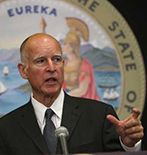The Social and Political Cost of Slow Economic Growth
The American people are blaming other countries and other people for a slow-growth wound that is self-inflicted.
Communist China Shows the U.S. How to Spur Economic Growth
We have entered a topsy-turvy world where the communist Chinese want to cut corporate tax rates to spur economic growth while the Obama administration would prefer to build a corporate Berlin Wall to keep U.S. companies from trying to lower their tax rates.
What Does California Have Against Veterans Getting Lower Drug Prices?
California has a plan to ensure lower-income veterans pay more for prescription drugs or won't get them at all.
Texas Telemedicine is Ailing
As yet another example of regulation hampering innovation, telemedicine in Texas is being held back by the Texas Medical Board.
Texas Telemedicine is Ailing
As yet another example of regulation hampering innovation, telemedicine in Texas is being held back by the Texas Medical Board.
Have Minimum Wage Increases Killed "Reshoring"?
Many lower income jobs were returning to the U.S., but that trend appears to have stopped, and workers can thank liberals for it.
Congress Steps In on AllVid Rulemaking
Commending congressional leaders for taking the first steps of Congressional oversight on the FCC’s controversial AllVid rulemaking.
Further Abandoning the Rule-of-Law
Yet again, the Obama administration has operated outside of the rule-of-law, which makes the US a less certain place for investment.
Ooops! Apparently CBO Made a $136 Billion Obamacare 'Boo-Boo'
Surprise! The Congressional Budget Office now says that Obamacare will cost a whole lot more than the government and our president predicted.
The California Governor's Plan to Create More Jobs in Texas
The governor doing more than anyone to create Texas jobs is Jerry Brown.












